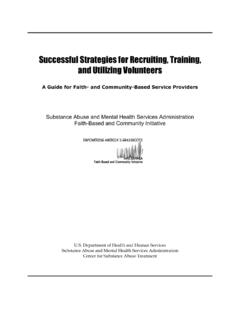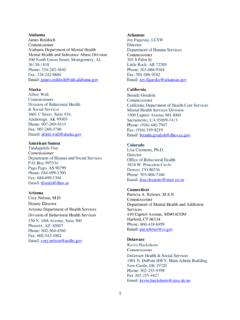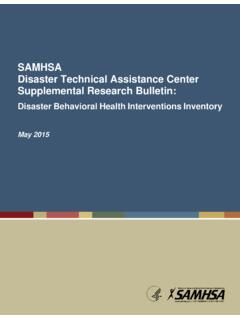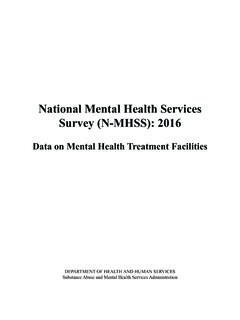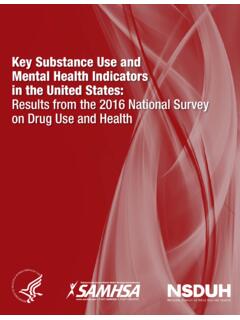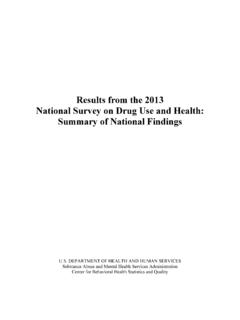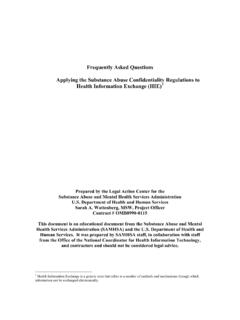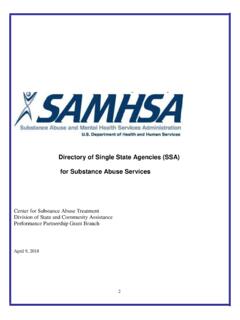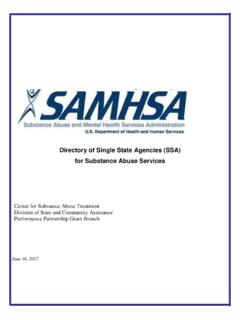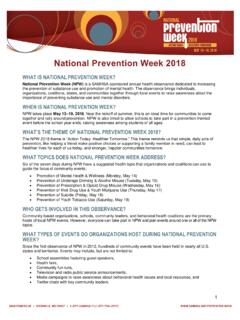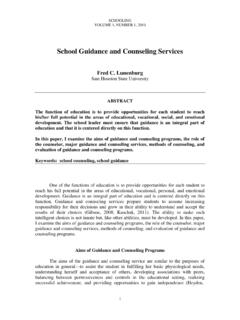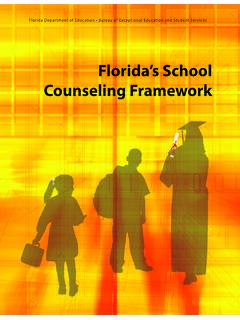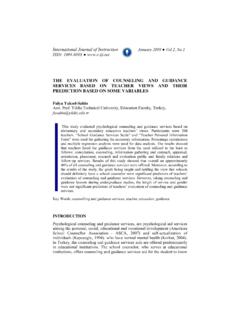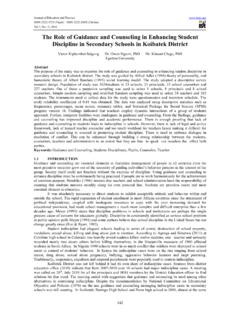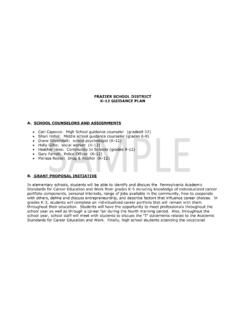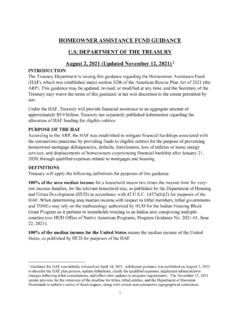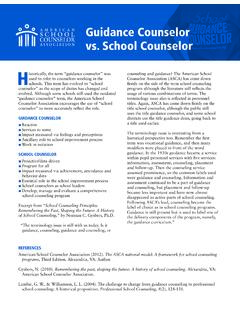Transcription of Crisis Counseling Assistance and Training Program Guidance
1 FEMA Crisis Counseling Assistance and Training Program Guidance CCP Application Toolkit, Version , July 2016 Note : Substance Abuse and Mental Health Services Administration (SAMHSA) Center for Mental Health Services (CMHS) Project Officers are available to provide technical Assistance and consultation on the Crisis Counseling Assistance and Training Program (CCP ). If y ou would like to speak with a CMHS Project Officer, please contact the SAMHSA Disaster Technical Assistance Center (DTAC) at 1-800 -308 -3515 (Monday Friday 9 5 eastern time), and a staff member will forward your request to the appropriate Project Officer. You may obtain CCP applications, supplemental instructions, and Guidance documents by calling SAMHSA DTAC as indicated above or by emailing SAMHSA DTAC at CCP Guidance , Version | Page i Table of Contents .. Introduction 1 Section I: Program Overview1 The Crisis Counseling Assistance and Training Program (CCP) Eligibility Requirements2 CCP Timeline3 Crisis Counseling Definition4 Services Funded Through the CCP4 Providers of CCP Services4 CCP Primary and Secondary Services 4 Primary CCP Services4.
2 Secondary CCP Services6 Section II: CCP Model6 Typical Individual Reactions to a Disaster 7 Typical Community Reactions to a Disaster 7 The Crisis Counseling Approach 8 The Value of the Crisis Counseling Approach 9 The Significance of the Needs Assessment 9 The Goal of the CCP 10 The CCP Model 10 Identifying People in Need of Crisis Counseling 11 Differences among CCP Resource Linkage, Case Management, and Advocacy 12 CCP Sub -recipients and Staff 13 The Number of Visits Allowed by a Crisis Counselor 13 How Crisis Counselors Are Trained 14 The Differences between Crisis Counseling and Traditional Mental Health Treatment 14 How the CCP Addresses Severe Disaster Reactions 15 Section III: Program Management and Implementation 15 Main Components of a Program Management Plan 16 Media and Marketing and the CCP16 Effective Staffing of the CCP 17 CCP Guidance , Version | Page ii .. Training 17 Staff Stress Management 18 Data Collection, Evaluation, and Reporting 19 Procedures for data collection and evaluation include the following: 19 Quality Assurance 20 Section IV: Pre-Award Requirements 20 Applying for the ISP Grant 21 Instruction for Submission of the ISP Application Packet 21 Extension of the ISP Performance Period 21 Applying for the RSP Grant 22 Instructions for Submission of the RSP Application Packet22 General Provisions 23 Conflict of Interest 23 Mandatory Disclosures 23 Performance Goal 24 Section V: Post-Award Requirements 24 Revision of Budget and Program Plans 24 Period of Performance 25 ISP Period of Performance 25 ISP Grant No-Cost Administrative Extension (for up to 60 days) 25 RSP Period of Performance 26 RSP Grant 90-Day No -Cost Administrative Extension 26 Procurement Requirements under a Federal Award 26.
3 Reporting (Programmatic and Fiscal Requirements) 26 Sub -rec ipient Monitoring and Management 27 Determining Sub-recipient or Contractor Classification 27 Monitoring and Management 27 Remedies for Noncompliance and Specific Conditions 29 Termination29 Opportunities to Object and Appeals of Application Decisions 30 Appeals of Remedies for Noncompliance 30 CCP Guidance , Version | Page iii Objections/Appeals of Decisions Regarding Allowable Costs .. Objections/Appeals of Termination or Suspension 31 Closeout and Retention Requirements for Records 31 ISP 31 RSP 31 Section VI: Budget and Fiscal Management 32 The Influence of the CCP Model (Fundable Costs) 32 The Budget Narrative 33 Requests for Budget Adjustments 34 Pre -award Costs (ISP Phase) 34 Indirect Costs 35 Cost Sharing, In-kind Resources, or Matching 35 Transfer of Funds 36 ISP 36 .. RSP 36 Appendix Section 37 Appendix A. Definit ions 37 Appendix B: CCP Services, Positions, and Job Descriptions 39 Appendix C: Instructions for the Budget Narrative 44 Required Supporting Documentation To Be Maintained by the CCP 51 Appendix D: SF-424 Tip Sheet 53 Appendix E: Federal Financial Report (FFR) SF-425 56 Appendix F: Federal Financial Report (FFR) SF-425 Instructions 57 FFR Instructions 57 Repo rting Re quir ements 57 Line- item Ins truc tions for the FFR 58 CCP Guidance , Version | Page 1 Introduction The Crisis Counseling Assistance and Training Program (CCP) is a federally funded supplemental Program administrated by the Department of Homeland Security (DHS) Federal Emergency Management Agency (FEMA).
4 Section 416 of the Robert T. Stafford Disaster Relief and Emergency Assistance Act, 42 5183 authorizes FEMA to fund mental health Assistance and Training activities in areas that have been declared a major disaster by the President. The Center for Mental Health Services (CMHS ), within the Substance Abuse and Mental Health Services Administration (SAMHSA), works with FEMA through an interagency agreement to provide technical Assistance , consultation, grant administration, Program oversight, and Training for state mental health authorities, . territories, and designated tribal authorities. The mission of the CCP is to assist individuals and communities in recovering from the effects of natural and human-caused disasters through the provision of community-based outreach and psycho-educational services. The CCP supports short-term interventions that involve assisting disaster survivors in understanding their current situation and reactions, mitigating stress, developing coping strategies, providing emotional support, and encouraging linkages with other individuals and agencies that help survivors in their recovery process.
5 The information presented in the Program guida nce is organized into seven sections: Program Overview, CCP Model, Program Management and Implementation, Pre -A ward Requirements, Post-Award Requirements, Budget and Fiscal Management, and the Appendix Section . The Program Guidance should be used in conjunction with the following: Immediate Services Program (ISP) and Regular Services Program (RSP) applications and supplemental instructions 44 C ode of Federal Regulations (CFR) Super Circular Requirements 2 CFR Part 200 Section I: Program Overview The Crisis Counseling Assistance and Training Program (CCP) The CCP consists of services focused on preventing or mitigating adverse repercussions of a disaster. This goal is achieved with a public health approach. Beginning with the most severely affected group and moving outward, the Program seeks to serve a large portion of the population affected by the disaster. CCP services are community based and take place anywhere survivors are, including, but not limited to , survivor homes, shelters, temporary living sites, and churches and other places of worship.
6 CCP Guidance , Version | Page 2 The CCP services include supportive Crisis Counseling , psycho-education, development of coping skills, and linkage to appropriate resources, while assessing and referring those members of the community who are in need of intensive mental health and substance use treatment to appropriate community resources. The CCP engages community gatekeepers and organizations through direct contact with stakeholder groups, such as unmet-needs committees, and participation in community events in order to facilitate response activities and services to survivors. Eligibility Requirements States, territories, and tribes that are impacted by a major disaster are eligible to receive CCP services. If the severity and magnitude of the disaster are beyond the scope of the state, t ribe , or territories ability to respond, the state, tribe, or territory may submit an application for supplemental federal Assistance through the CCP.
7 The CCP is a supplemental disaster relief Program and is not intended to supplant existing state and local resources. To obtain Assistance under the CCP Program , the Governor or his/her authorized representative must initiate an assessment of the need for Crisis Counseling services within 10 days of the date of the major disaster declaration. In order to receive CCP funding, the state, territory, or tribe must provide a description of the state and local resources and capabilities, and an explanation of why these resources cannot meet the (3)(d)(f)(iii) Following the grant award and throughout the life of the Program , grantees are expected to conduct ongoing needs assessment to justify continued supplemental funding. Immediate Services Program : The ISP application must be submitted to the FEMA Regional Administrator no later than 14 days from the date of declaration. The ISP provides funding not to exceed 60 days from the date of the declaration, except if the state, territory or tribe has submitted an application for the RSP.
8 If an RSP application is submitted, the ISP may continue for 30 additional days while the RSP application is being reviewed for (f)(1)(i)(ii) Any funds granted pursuant to an immediate services programs , all funds must be expended solely for the purposes specified in the approved application and budget, regulations, the terms of conditions of the award, and the applicable principles prescribed in 44 CFR part (f)(v) The state, territory or tribe may appeal the Regional Administrator s decision by submitting information justifying a reversal of the decision within 60 days of the date of notification of the CCP Guidance , Version | Page 3 application decision. The Regional Director shall review the material submitted, and after consultation with the Secretary, notify the state, territory or tribe, in writing within 15 days of receipt of the appeal, of his/her (f)(5)(i) The Regular Services Program : The RSP application must be submitted by the Governor or his/her authorized representative to the Assistant Administrator for the Recovery Directorate through the Regional Administrator, and simultaneously to the Secretary no later than 60 days following the declaration of the major disaster.
9 The RSP will not exceed 9 months from the date of the Notice of Award (NOA), except that upon the request of the state, territory or tribe to the Regional Administrator and the Secretary, the Assistant Administrator for the Recovery Directorate may extend the Program period for more than 90 days where he or she deems it to be the public (g)(4)(i) The state, territory or tribe may appeal the Assistant s Administrator s decision, in writing, within 60 days of the date of notification of the decision. The Assistant Administrator, in consultation with the Secretary and Regional Administrator, shall review the material submitted and notify the state, territory or tribe, in writing within 15 days of receipt of the appeal, of his/her (5) CCP Timeline CCP Guidance , Version | Page 4 Crisis Counseling Definition Crisis Counseling means the application of individual and group treatment procedures which are designed to ameliorate the mental and emotional crises and their subsequent psychological and behavioral conditions resulting from a major disaster or its (b)(3) Services Funded T hrough the CCP The CCP funds the following services.
10 Individual Crisis Counseling Basic supportive or educational contact Group Crisis Counseling Public education Community networking and support Assessment, referral, and resource linkage Development and distribution of educational materials Media and public service announcementsProviders of CCP Services CCP services can be provided by the state, territory or tribe or through a contract with local mental health service providers that are familiar with the communities affected by the disaster. The CCP encourages the use of mental health professionals and trained paraprofessionals, preferably people who live and work in the community and reflect the cultural makeup of the community served. CCP Primary and Secondary Services Ther e are two types of CCP services: primary and secondary. Primary CCP services are higher in intensity , as they involve personal contact with individuals, families, or groups. Secondary CCP services have a broader reach and less intensity with a focus of reaching as many people as possible.
